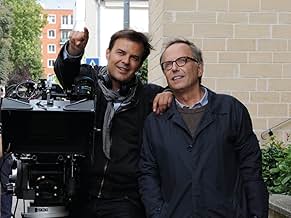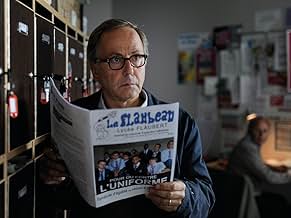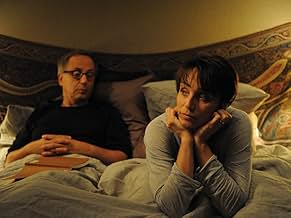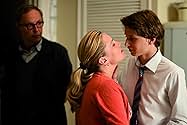Ein Französischlehrer an einer Highschool wird in die zunehmend transgressive Geschichte eines frühreifen Schülers über seine Beziehung zur Familie eines Freundes hineingezogen.Ein Französischlehrer an einer Highschool wird in die zunehmend transgressive Geschichte eines frühreifen Schülers über seine Beziehung zur Familie eines Freundes hineingezogen.Ein Französischlehrer an einer Highschool wird in die zunehmend transgressive Geschichte eines frühreifen Schülers über seine Beziehung zur Familie eines Freundes hineingezogen.
- Regie
- Drehbuch
- Hauptbesetzung
- Auszeichnungen
- 10 Gewinne & 23 Nominierungen insgesamt
Jana Bittnerová
- La doublure de la jumelle
- (as Jana Bittnerova)
Empfohlene Bewertungen
For his thirteenth feature film, French New Wave director Francois Ozon has outdone all acclaim given to his 2002 remake of "8 Women" with a mischievous and dysfunctional tale, of what can be perceived as
coming-of-age.
A black comedy conflated with so much grandeur from literary greats to post-modern poioumena, you cannot help but wave the white flag and just go along in service of jest and sheer curiosity.
Adapted from a brilliant play written by Juan Mayorgo, this film is a meta-narrative centered on Claude Garcia (Ernst Umhauer) -- a sixteen year old loner who intrudes upon the home life of fellow student Rapha Jr., and writes about it. What begins as a one-off weekend assignment for literature class, escalates with great passion and frequency when Claude's teacher, Germaine (Fabrice Luchini) detects flashes of talent and decides to groom the teenager.
Here, Ozon proposes a three-fold narrative weaving through the surface of three realities -- Germaine's growing obsession with Claude's story imitates the viewers' relationship with Ozon's film (and perhaps soap opera addiction), and Claude as a self-conscious narrator of the events occurring inside Rapha's house.
When the film begins, Claude is unhappy with a lonely life and clearly needs to distract himself with wholesome family warmth. Having witnessed Rapha's close relationship with parents Rapha Sr. and Esther at the school gate, strikes a friendship with the boy when semester begins. Establishing himself as a math tutor and study mate, Claude quickly wins their affection and trust. Thrilled by this opportunity to experience life with a sense of belonging, yet predisposed to primitive urge, Claude's desire swells into furtive yearning for Esther. And naturally, things get complicated.
As Germaine's involvement with Claude's writing departs from passive reader, to that of a story-telling coach superimposing rules of dramatic structure, it occurs to the viewer that he may very well be a shaping hand in the outcome of this voyeuristic experiment.
Of course, the fabrics of fiction and reality overlap but they do not confuse -- the satirical logic unfolds in ways that are thought- provoking, humorous and downright captivating.
cinemainterruptus.wordpress.com
A black comedy conflated with so much grandeur from literary greats to post-modern poioumena, you cannot help but wave the white flag and just go along in service of jest and sheer curiosity.
Adapted from a brilliant play written by Juan Mayorgo, this film is a meta-narrative centered on Claude Garcia (Ernst Umhauer) -- a sixteen year old loner who intrudes upon the home life of fellow student Rapha Jr., and writes about it. What begins as a one-off weekend assignment for literature class, escalates with great passion and frequency when Claude's teacher, Germaine (Fabrice Luchini) detects flashes of talent and decides to groom the teenager.
Here, Ozon proposes a three-fold narrative weaving through the surface of three realities -- Germaine's growing obsession with Claude's story imitates the viewers' relationship with Ozon's film (and perhaps soap opera addiction), and Claude as a self-conscious narrator of the events occurring inside Rapha's house.
When the film begins, Claude is unhappy with a lonely life and clearly needs to distract himself with wholesome family warmth. Having witnessed Rapha's close relationship with parents Rapha Sr. and Esther at the school gate, strikes a friendship with the boy when semester begins. Establishing himself as a math tutor and study mate, Claude quickly wins their affection and trust. Thrilled by this opportunity to experience life with a sense of belonging, yet predisposed to primitive urge, Claude's desire swells into furtive yearning for Esther. And naturally, things get complicated.
As Germaine's involvement with Claude's writing departs from passive reader, to that of a story-telling coach superimposing rules of dramatic structure, it occurs to the viewer that he may very well be a shaping hand in the outcome of this voyeuristic experiment.
Of course, the fabrics of fiction and reality overlap but they do not confuse -- the satirical logic unfolds in ways that are thought- provoking, humorous and downright captivating.
cinemainterruptus.wordpress.com
This awkward and witty film is based on the play The Boy in the Last Row by Juan Mayorga, i.e. the script emanates from a solid creation. The run of the events is smooth, but sometimes it is tricky to follow the line between truth and fantasy, including the ending scenes, and some deeds remained mystery to me. In spite of serious topics touched (e.g. alienation, growing pains, loneliness, generation gaps), there are several funny scenes, particularly gallery-related ones, and strong performances provide additional value to the film (Fabrice Luchini as Germain Germain, Ernst Umhauer (skilfully depicting an 16-year-old while being 22) as Claude Garcia, Kristin Scott Thomas (in fluent French) as Jeanne Germain, Emmanuelle Seigner as Esther Artole - in particular). Hopefully, no remake will be made, as the sound of French and supposition of Frenchmen are just appropriate for such a film.
Recommended to all those fond of films with twists and not afraid of subtitles.
Recommended to all those fond of films with twists and not afraid of subtitles.
Often funny, sometimes disturbing and sensual, the movie can be enjoyed at face value, but the heart of the movie lies underneath that appealing veneer, it's about creation and the required necessity to live your life fully to feed it. The budding writer enters the lives of a family, the same way a writer should embrace life itself, with a healthy dose of curiosity and nerve, precisely what his teacher is lacking. Add to that a fascinating and intricate observation of the blurring of lines separating reality from fiction in the feverish midst of artistic creation. Deep stuff, but all wrapped up in a neat bundle, Ozon making sure to leave almost no one on the side of the road, so to speak. So in conclusion it's smart and yet playful, intellectual but never pretentious. Well, in other words, it's a very good movie about potentially boring subjects. Highly recommended in those times of idiocracy!
This is a very interesting film taking both the point of view of a sixteen year old school boy and that of a middle aged teacher, with you dear viewer, playing yet another role. Ah ha, so, what we start with is a perhaps knowingly voyeuristic homework task set by the bored literacy tutor. Then we have the youth delivering precisely the kind of inflammatory story that reignites the tutor's interest. It's a dangerous game they both play - almost as if the boy were repeating the tutor's own youth with his post hoc adult knowledge. The innocents in this tale are ignored - or rather, their real stories are overlooked by both boy writer and his tutor whilst they play their silly game. The tutor's wife sees through the whole charade but then even her story is corrupted by inclusion in the boy's story-making. You, the viewer, need to pick carefully through the evidence you are presented. Do you want the boy to succeed? Do you want to encourage the teacher? Shame on you! You've gone down a garden path you should never have entered! Brilliant!
In the House (2012)
Another curious reality shifting movie in the most subtle and old fashioned of ways—the realism of good fiction. A young writer creates a reality in his essays that is shown as if real on screen. The characters around the writer, and within the fictional story, get intertwined because they are all the same. This game of deception is coy but also witty and warm, and it's a fun, genuine movie.
I'm not sure how much logic you should try to apply to things here. I assume they have it worked out perfectly, but watching it lightly the layers of reality get necessarily confusing. In a way this doesn't matter, because you get the general drift.
Which is this: a literature teacher in high school has a talented student, Claude, who writes fictional essays about real people. One is another student, Rapha, and we see events in this other student's house because of the writing (and have to guess whether or not those events are fact or fiction).
The teacher talks to Claude about the content, wondering if it's fair to lay open Rapha's life, and the student smartly says that it was written for the teacher alone. This brings the teacher into the story in ways he doesn't suspect. It also shows the audience that Claude is outfoxing his teacher and we are going to see a game played as Claude's writings raise reactions in the teacher that affect the fictional plot. Or is it the actual plot? Or both?
Exactly.
The director, Francois Ozon, is no stranger to this type of game playing. The famous earlier film of his in the U.S. is "Swimming Pool," a remake of an earlier film that has the same tricks played on the audience. It's never quite enough to have this slippery reality be the basis of a movie, and in "Swimming Pool" the events became quite dramatic and psychologically interesting. The ambitions for "In the House" are smaller and less chilling, and in a way less effective, but also less sensationalist and more believable. We have here more of an ensemble piece, a charmer, a play brought to the screen.
And it does rise above mere literary cleverness because of the leading man, the teacher, played by Fabrice Luchini, who will be familiar even to American audiences. His wife is the dependable Kristin Scott Thomas (speaking in French). The two of them make a likable intellectual couple (and her own role as an contemporary art dealer plays a small part in the plot). The way they talk about Claude's regular installments is how we get to think about the interweaving of realities.
And does it ever get interwoven. Keep track of it is you can. Otherwise, just enjoy the show.
Another curious reality shifting movie in the most subtle and old fashioned of ways—the realism of good fiction. A young writer creates a reality in his essays that is shown as if real on screen. The characters around the writer, and within the fictional story, get intertwined because they are all the same. This game of deception is coy but also witty and warm, and it's a fun, genuine movie.
I'm not sure how much logic you should try to apply to things here. I assume they have it worked out perfectly, but watching it lightly the layers of reality get necessarily confusing. In a way this doesn't matter, because you get the general drift.
Which is this: a literature teacher in high school has a talented student, Claude, who writes fictional essays about real people. One is another student, Rapha, and we see events in this other student's house because of the writing (and have to guess whether or not those events are fact or fiction).
The teacher talks to Claude about the content, wondering if it's fair to lay open Rapha's life, and the student smartly says that it was written for the teacher alone. This brings the teacher into the story in ways he doesn't suspect. It also shows the audience that Claude is outfoxing his teacher and we are going to see a game played as Claude's writings raise reactions in the teacher that affect the fictional plot. Or is it the actual plot? Or both?
Exactly.
The director, Francois Ozon, is no stranger to this type of game playing. The famous earlier film of his in the U.S. is "Swimming Pool," a remake of an earlier film that has the same tricks played on the audience. It's never quite enough to have this slippery reality be the basis of a movie, and in "Swimming Pool" the events became quite dramatic and psychologically interesting. The ambitions for "In the House" are smaller and less chilling, and in a way less effective, but also less sensationalist and more believable. We have here more of an ensemble piece, a charmer, a play brought to the screen.
And it does rise above mere literary cleverness because of the leading man, the teacher, played by Fabrice Luchini, who will be familiar even to American audiences. His wife is the dependable Kristin Scott Thomas (speaking in French). The two of them make a likable intellectual couple (and her own role as an contemporary art dealer plays a small part in the plot). The way they talk about Claude's regular installments is how we get to think about the interweaving of realities.
And does it ever get interwoven. Keep track of it is you can. Otherwise, just enjoy the show.
Wusstest du schon
- WissenswertesErnst Umhauer said this about the character he plays in the movie: "He confuses his writing with reality and turns everything in his path upside-down. He has no distance, it takes him a long time to realize his words are stinging and can do damage. He's smart, but not very conscious of his responsibility".
- Patzer(at around 1h 35 mins) While Claude is walking through park, his hair is parted on different sides between shots.
- Zitate
Claude Garcia: But I love you.
Esther Artole: No. It's not me you love. It's an image. An image in your head.
- Crazy CreditsThe opening credits are shown as if they were hand-written on graph paper.
- VerbindungenReferenced in La noche de...: La noche de... En la casa (2018)
- SoundtracksDynasty Tching Memories
Interprete par Wang Shu Imperial Orchestra
Arrangement de Thierry Woelfel
®2002 FGL Productions S.A, © Editions FGL
Avec l'aimable autorisation de FGL Productions S.A
Top-Auswahl
Melde dich zum Bewerten an und greife auf die Watchlist für personalisierte Empfehlungen zu.
- How long is In the House?Powered by Alexa
Details
- Erscheinungsdatum
- Herkunftsland
- Offizielle Standorte
- Sprache
- Auch bekannt als
- En la casa
- Drehorte
- Produktionsfirmen
- Weitere beteiligte Unternehmen bei IMDbPro anzeigen
Box Office
- Bruttoertrag in den USA und Kanada
- 389.757 $
- Eröffnungswochenende in den USA und in Kanada
- 31.441 $
- 21. Apr. 2013
- Weltweiter Bruttoertrag
- 16.190.771 $
- Laufzeit1 Stunde 45 Minuten
- Farbe
- Sound-Mix
- Seitenverhältnis
- 1.85 : 1
Zu dieser Seite beitragen
Bearbeitung vorschlagen oder fehlenden Inhalt hinzufügen






























